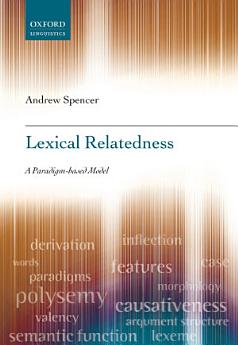Lexical Relatedness
10/2013 · OUP Oxford
Livro eletrónico
480
Páginas
family_home
Elegível
info
reportAs classificações e as críticas não são validadas Saiba mais
Acerca deste livro eletrónico
This book argues (a) that there is no principled way to distinguish inflection and derivation and (b) that this fatally undermines conventional approaches to morphology. Conceptual shortcomings in the relation between derivational and lexically-derived word forms, Andrew Spencer suggests, call into question the foundation of the inferential-derivational approach. Prototypical instances of inflection and derivation are separated by a host of intermediate types of lexical relatedness, some discussed in the literature, others ignored. Far from finding these an embarrassment Professor Spencer deploys the wealth of types of relatedness in a variety of languages (including Slavic, Uralic, Australian, Germanic, and Romance) to develop an enriched and morphologically-informed model of the lexical entry. He then uses this to build the foundations for a model of lexical relatedness that is consistent with paradigm-based models. Lexical Relatedness is a profound and stimulating book. It will interest all morphologists, lexicographers, and theoretical linguists more generally.
Acerca do autor
Andrew Spencer is Professor of Linguistics at the University of Essex. His publications include The Handbook of Morphology, (1998, co-edited with Arnold Zwicky), Phonology: Description and Analysis (1996), and Morphological Theory (1991), all published by Wiley-Blackwell. He is also the co-author of Clitics: An Introduction (2012), with Ana Luís, published by Cambridge University Press.
Classifique este livro eletrónico
Dê-nos a sua opinião.
Informações de leitura
Smartphones e tablets
Instale a app Google Play Livros para Android e iPad/iPhone. A aplicação é sincronizada automaticamente com a sua conta e permite-lhe ler online ou offline, onde quer que esteja.
Portáteis e computadores
Pode ouvir audiolivros comprados no Google Play através do navegador de Internet do seu computador.
eReaders e outros dispositivos
Para ler em dispositivos e-ink, como e-readers Kobo, tem de transferir um ficheiro e movê-lo para o seu dispositivo. Siga as instruções detalhadas do Centro de Ajuda para transferir os ficheiros para os e-readers suportados.




